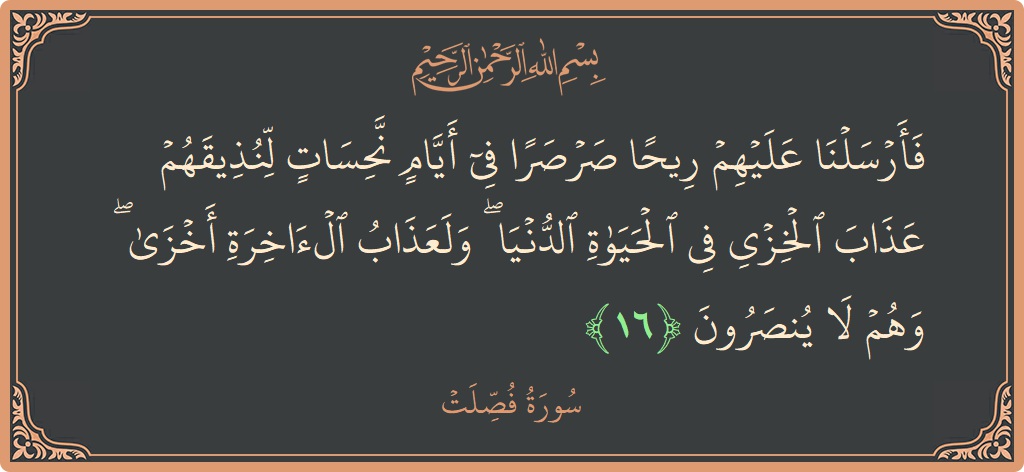Surah Fussilat: Verse 16 - فأرسلنا عليهم ريحا صرصرا في... - English
Tafsir of Verse 16, Surah Fussilat
English Translation
So We sent upon them a screaming wind during days of misfortune to make them taste the punishment of disgrace in the worldly life; but the punishment of the Hereafter is more disgracing, and they will not be helped.English Transliteration
Faarsalna AAalayhim reehan sarsaran fee ayyamin nahisatin linutheeqahum AAathaba alkhizyi fee alhayati alddunya walaAAathabu alakhirati akhza wahum la yunsaroonaTafsir of Verse 16
فَأَرْسَلْنَا عَلَيْهِمْ رِيحًا صَرْصَرًا (So, We let loose a wild wind on them - 41:16) This is the explanation of what was mentioned as ` calamity of ` Ad and Thamud' in the earlier verse. The Arabic word used in the text is sa` igah. It originally means ` something that renders one unconscious. That is why the thunderbolt is also called sa'iqah, and unforeseen calamity and disaster is also called sa` iqah. The storm which entrapped the people of ` Ad was also a 'sa'iqah', and has been mentioned in the present verse as ` wild wind' which was a wild tempest of extremely high speed and had piercing sound. (Qurtubi)
Mentioning the details of this tempest, Dahhak has said that rains had been totally stopped from them by Allah Almighty for three years, and dry tempestuous winds kept on blousing all the time, and for eight days and seven nights, they had continuous extremely severe windstorm. Some narrations have it that this event took place in the end of month of Shawwal, commenced on a Wednesday and kept on till the next Wednesday. Whenever any nation has been subjected to a scourge, it has happened on a Wednesday. (Qurtubi, Mazhari)
Sayyidna Jabir Ibn ` Abdullah ؓ has stated that when Allah Almighty wants the welfare of a nation, He orders rain to fall on them, and stops very fast winds from blousing over them, whereas when a nation is to face a misfortune, rain is withheld from them, and strong winds start blousing frequently.
فِي أَيَّامٍ نَّحِسَاتٍ (in unlucky days....41:16). It is established by the principles of Islam and ahadith of the Holy Prophet ﷺ that no day or night is in itself unlucky or ill-omened. The days of the windstorm over the people of ` Ad have been called ` unlucky' because those days had become ill-omened for them due to their misdeeds. It does not necessarily mean that those days were ill-omened for everybody. (Mazhari and Bayan-ul-Qur’ an). The detailed investigation as to whether anything can be ill-omened by its nature can be seen in the author's book Ahkam-ul-Qur'an Vol. 5 in Arabic)
